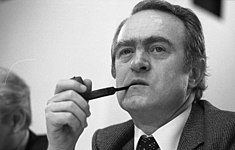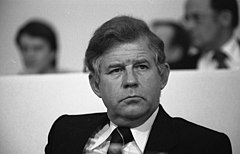| |||||||||||||||||||||||||||||||||||||||||
All 201 seats in the Landtag of North Rhine-Westphalia 101 seats needed for a majority | |||||||||||||||||||||||||||||||||||||||||
|---|---|---|---|---|---|---|---|---|---|---|---|---|---|---|---|---|---|---|---|---|---|---|---|---|---|---|---|---|---|---|---|---|---|---|---|---|---|---|---|---|---|
| Turnout | 9,874,427 (80.0% | ||||||||||||||||||||||||||||||||||||||||
| |||||||||||||||||||||||||||||||||||||||||
 Results for the single-member constituencies. | |||||||||||||||||||||||||||||||||||||||||
| |||||||||||||||||||||||||||||||||||||||||
The 1980 North Rhine-Westphalia state election was held on 11 May 1980 to elect the 9th Landtag of North Rhine-Westphalia. The outgoing government was a coalition of the Social Democratic Party (SPD) and Free Democratic Party (FDP) led by Minister-President Johannes Rau.
The result was a clear victory for the SPD, who won an absolute majority of 106 seats in the Landtag with 48.4% of the vote. The opposition Christian Democratic Union (CDU) declined to 43.2% and remained steady on 95 seats. The SPD's majority was ensured by the failure of the FDP to re-enter parliament: they fell just short of the 5% electoral threshold and lost all their seats. The SPD went on to form government alone for the first time in the state's history; Johannes Rau was re-elected Minister-President by the Landtag on 4 June.[1]
Cite error: There are <ref group=lower-alpha> tags or {{efn}} templates on this page, but the references will not show without a {{reflist|group=lower-alpha}} template or {{notelist}} template (see the help page).
- ^ "Minutes of the Landtag session of 4 June 1980" (PDF). Landtag of North Rhine-Westphalia (in German). 4 June 1980.


